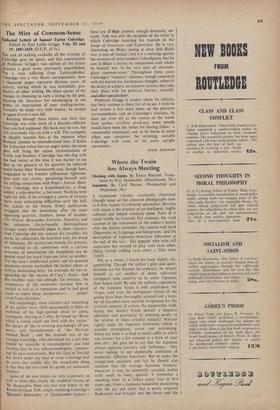The Mire of Common-Sense
THE task of making available all the writings of 'Coleridge goes on apace, and this continuation Qf Professor Griggs's vast edition of the letters iontains a good many previously unpublished. For a man suffering from `Letterophobia' Coleridge was a very fluent correspondent; here a thousand. pages represent thirteen years of •
activity, during which he was wretchedly pro- ductive of other writing. He often speaks of his iniStake in choosing to earn a living by his pen,
blaming the Spectator for encouraging in the Public an expectation of easy reading-matter. Certainly he made very little money; he needed
• an agent if ever a man did.
Reading through these letters, one feels that Coleridge was even more of a disaster-collector
than one had supposed. His back may be raw, but
Still everybody lays on with a will. The malignity Of Hazlitt wounds him at the moment when Brabant chooses to misunderstand him; if Estlin the Unitarian writes him an angry letter, the same Post will bring the unjust recriminations of Cottle and Southey. Coleridge was the dog with the bad name; at the time it was harder to see that in the greatest of his quarrels he behaved much better than Wordsworth and, though hurt, responded to his friend's stiffnecked righteous- ness with real charity, permitting himself only
the telling comparison with Pope's Atticus. How-
ever, Coleridge was a hypochondriac, a drug- addict, a' wife-deserter, a borrower. Nothing went right for hiin. If he arranged a course of lectures there were exhausting difficulties over the hall, the tickets or his fitness, Every publication struggled into the bookshops after the most
agonising quarrels, slanders, losses of income; The Friend, Biographia Literaria, Zapolyta, and the infamous Encyclopledia Met ropolitana
occupy many distressed pages in these volumes.' And Coleridge did not conceal his troubles; his Pains, his addictions, his heartless wife, his dread
of lithotOmy, his recalcitrant bowels, his poverty, are retailed to all; sometimes with a curious
economy of lamentation the Complaints are re- peated word for word from one letter to another. Yet the man's intellectual power and his genuine
goodness remain unclouded. He helped others as Welll'as demanding help: for 'example,- he was re- sponsible for the success of Cary's Dante. And his troubles were real enough; for instance, the viciousness of the reviewers touched him in , Pocket as well as in reputation, and he had good; cause to resent these `prawitstatores . . . palate- sered Taste-dictators.'
Not surprisingly, these volumes lack something of his earlier verve. Only occasionally is there an outbreak of his high-spirited abuse or comic neologism. Staying in Caine, he found no 'Brain Which a Louse could not ford with dry ancles.' He speaks of 'the re-creating psychologic (if not omni-, yet) hominiscience of "the Myriad- minded Bard" '; and this reminds one of the Younger Coleridge, who advertised for a girl who Should be 'scientific in vaccimulgence' and told Southey that he was 'athanasiophagotis,' consum- ing his own immortality. But this kind of fun did not thrive under the load of cares Coleridge had to carry into middle life; the remarkable thing IS that they did not crush his gentle yet audacious intellect.
Some of the new letters are very important; as well as those that clarify the muddled history of the Biographia there are two vast, letters to the Swedenborgian Tulk, amply outlining Coleridge'3 'Dynamic philosophy' or 'ZoOdynamic System.— these are of high interest, though damnably ob- scure. Tulk was also the recipient of the letter in which Coleridge recorded his reaction to the Songs of Innocence and Experience. He is very s interesting on Blake,- seeing at once that Blake was 'a man of Genius'; but it is a warning against - the excesses of some modern Coleridgeans that he saw in Blake a mystic by comparison with whom he himself was 'in the very mire of common- place common-sense.' Throughout these years Coleridge's 'visionary' interests, though consistent with his•hatred for mechanistic thought, subserve his desire to achieve an inclusive system; they take , their place with his political, literary, scientific and zither speculations.
Professor. Griggs is modest about his labours, but their vastness is there for all to see. I. wish he had written a few more' notes on the obscurer correspondents, and on Coleridge's citations; he does not even tell us the source of the words Stint ottibus cecidisse prodesset, some people would have been the better for having fallen : a memorable expression, and to be borne in mind when one compares the writhing, amiable Coleridge with some of his more upright tormentors.
FRANK KERMODE


































 Previous page
Previous page